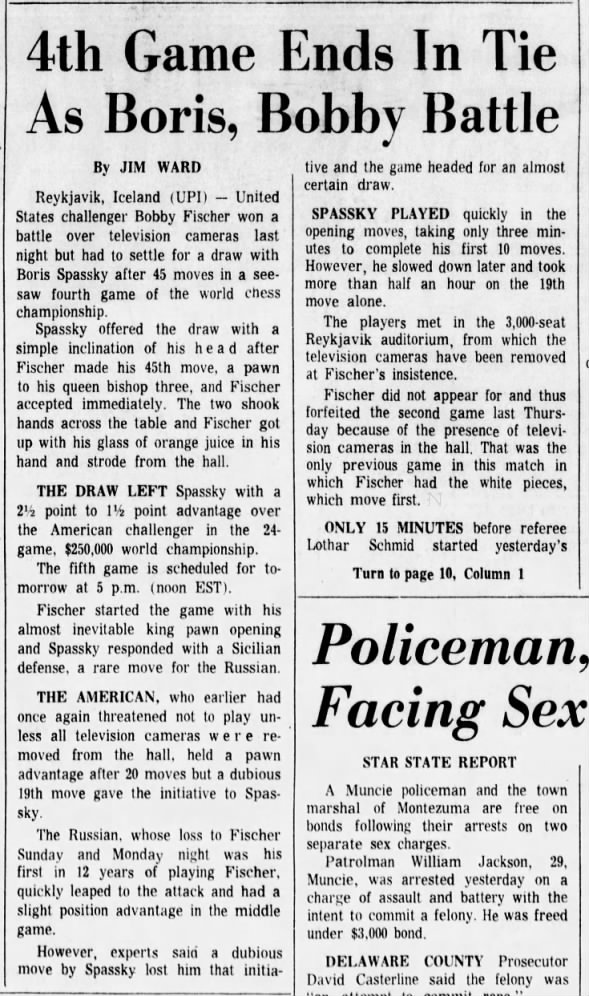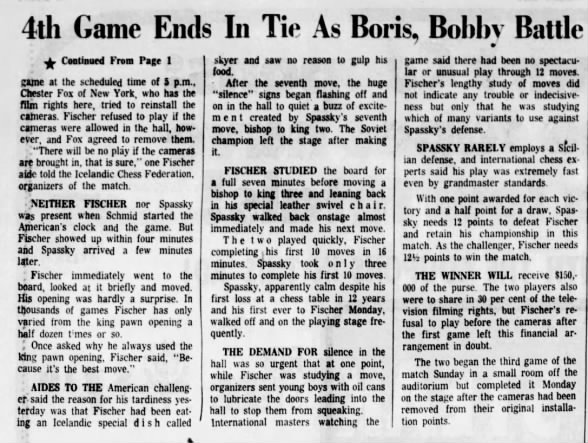The Indianapolis Star Indianapolis, Indiana Wednesday, July 19, 1972 - Page 10
4th Game Ends In Tie As Boris, Bobby Battle by Jim Ward
Reykjavik, Iceland (UPI)—United States challenger Bobby Fischer won a battle over television cameras last night but had to settle for a draw with Boris Spassky after 45 moves in a see-saw fourth game of the world chess championship.
Spassky offered the draw with a simple inclination of his head after Fischer made his 45th move, a pawn to his queen bishop three, and Fischer accepted immediately. The two shook hands across the table and Fischer got up with his glass of orange juice in his hand and strode from the hall.
THE DRAW LEFT Spassky with a 2½ point to 1½ point advantage over the American challenger in the 24-game, $250,000 world championship.
The fifth game is scheduled for tomorrow at 5 p.m. (noon EST).
Fischer started the game with his almost inevitable king pawn opening and Spassky responded with a Sicilian defense, a rare move for the Russian.
THE AMERICAN, who earlier had once again threatened not to play unless all television cameras were removed from the hall, held a pawn advantage after 20 moves but a dubious 19th move gave the initiative to Spassky.
The Russian, whose loss to Fischer Sunday and Monday night was his first in 12 years of playing Fischer, quickly leaped to the attack and had a slight positional advantage in the middle game.
However, experts said a dubious move by Spassky lost him that initiative and the game headed for an almost certain draw.
SPASSKY PLAYED quickly in the opening moves, taking only three minutes to complete his first 10 moves. However, he slowed down later and took more than half an hour on the 19th move alone.
The players met in the 3,000-seat Reykjavik auditorium, from which the television cameras have been removed at Fischer's insistence.
Fischer did not appear for and thus forfeited the second game last Thursday because of the presence of ([audibly and visually disruptive men operating]) television cameras in the hall. That was the only previous game in this match in which Fischer had the white pieces, which move first.
ONLY 15 MINUTES before referee Lothar Schmid started yesterday's game at the scheduled time of 5 p.m., Chester Fox of New York, who has the film rights here, tried to reinstall the ([human-operated crews of large, bulky]) cameras. Fischer refused to play if the ([disruptive crews of men operating the]) cameras were allowed in the hall, however, and Fox agreed to remove them.
“There will be no play if the cameras are brought in, that is sure,” one Fischer aide told the Icelandic Chess Federation, organizers of the match.
NEITHER FISCHER nor Spassky was present when Schmid started the American's clock and the game. But Fischer showed up within four minutes and Spassky arrived a few minutes later.
Fischer immediately went to the board, looked at it briefly and move. His opening was hardly a surprise. In thousands of games Fischer has only varied from the king pawn opening a half dozen times or so.
Once asked why he always used the king pawn opening, Fischer said “Because it's the best move.”
AIDES TO THE American challenger said the reason for his tardiness yesterday was that Fischer had been eating an Icelandic special dish called skyr and saw no reason to gulp his food.
After the seventh move, the huge “silence” signs began flashing off an on in the hall to quiet a buzz of excitement created by Spassky's seventh move, bishop to king two. The Soviet champion left the stage after making it.
FISCHER STUDIED the board for a full seven minutes before moving a bishop to king three and leaning back in his special leather swivel chair. Spassky walked back onstage almost immediately and made his next move.
The two played quickly, Fischer completing his first 10 moves in 16 minutes. Spassky took only three minutes to complete his first 10 moves.
Spassky, apparently calm despite his first loss at a chess table in 12 years and his first ever to Fischer Monday, walked off an on the playing stage frequently.
THE DEMAND FOR silence in the hall was so urgent that at one point, while Fischer was studying a move, organizers sent young boys with oil cans to lubricate the doors leading into the hall to stop them from squeaking.
International masters watching the game said there had been no spectacular or unusual play through 12 moves. Fischer's lengthy study of moves did not indicate any trouble or indecisiveness but only that he was studying which of many variants to use against Spassky's defense.
SPASSKY RARELY employs a Sicilian defense, and international chess experts said his play was extremely fast even by grandmaster standards.
With one point awarded for each victory and a half point for a draw, Spassky needs 12 point to defeat Fischer and retain his championship in this match. As the challenger, Fischer needs 12½ points to win the match.
THE WINNER WILL receive $150,000 of the purse. The two players also were to share in 30 per cent of the television filming rights, but Fischer's refusal to play before the ([disruptive crews of men hired to operate the bulky and visually and audibly disruptive]) cameras after the first game left this financial arrangement in doubt ([and Fischer himself was upset that the match couldn't have been filmed, however, he was misled to believe stationary cameras that were automatic were to be installed and in use, after arrival to the first match, learned he had been misled by Soviet-Icelandic organizers and their co-conspirator Chester Fox, Inc.])
The two began the third game of the match Sunday in a small room off the auditorium but completed it Monday on the stage after the cameras had been removed from their original location points.
 4th Game Ends In Tie As Boris, Bobby Battle 19 Jul 1972, Wed The Indianapolis Star (Indianapolis, Indiana) Newspapers.com
4th Game Ends In Tie As Boris, Bobby Battle 19 Jul 1972, Wed The Indianapolis Star (Indianapolis, Indiana) Newspapers.com
 4th Game Ends In Tie As Boris, Bobby Battle 19 Jul 1972, Wed The Indianapolis Star (Indianapolis, Indiana) Newspapers.com
4th Game Ends In Tie As Boris, Bobby Battle 19 Jul 1972, Wed The Indianapolis Star (Indianapolis, Indiana) Newspapers.com
























